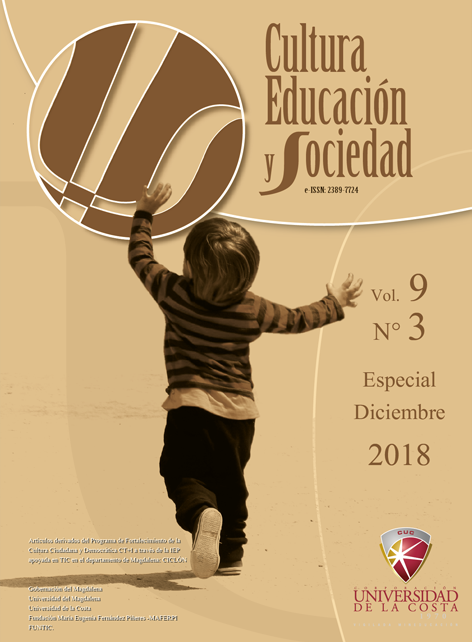Strengthening Cultural Identity from research as a pedagogical strategy
DOI:
https://doi.org/10.17981/cultedusoc.9.3.2018.93Keywords:
Research as a pedagogical strategy, cultural identity, communication and information technology.Abstract
This article shows results derived from the study Strengthening Cultural Identity developed at the Loma del Bálsamo District Educational Institution, Lleras station headquarters, located in the municipality of Algarrobo, Department of Magdalena, as evidence through the implementation of Research as a Pedagogical Strategy supported by information and communication technology, ICT; the existence of cultural and ideological diversity that show the identity of a society and its members can be strengthened; specifying the way how from the implementation of research supported by information and communication technology, the students of the Institution, are empowered by the elements that characterize and identify their cultural idiosyncrasy. It also points out how the implementation of research as a Pedagogical Strategy for the Strengthening of Cultural Identity can be converted into a transversal axis of the curriculum so that it can be approached from different teaching areas.
Downloads
References
Báez y Pérez de Tudela, J. (2009). Investigación cualitativa. Madrid, España: ESIC Editorial.
Cruz, M. (2015). La niñez en la escuela: Una historia de poder, control y desarrollo. Cultura Educación y Sociedad 6(1), 127-139.
De la Concepción, A. (2015). Concepciones sobre participación de niñas, niños y adolescentes: Su importancia en la construcción de la convivencia escolar. Cultura Educación y Sociedad, 6(2). Recuperado a partir de https://revistascientificas.cuc.edu.co/culturaeducacionysociedad/article/view/840
García, A. (2015). Los beneficios de la Tecnología en la Educación | Artículos. Labrechadigital.org. Retrieved from http://www.labrechadigital.org/labrecha/Articulos/los-beneficios-de-la-tecnologia-en-la-educacion.html
Gutiérrez, Carmen, Carrera, María, Marín, Freddy, Narváez, Mercy, Pérez, Carmen, Integración de redes académicas para la gestión del desarrollo endógeno regional. Multiciencias [en linea] 6(3) Disponible en:<http://www.redalyc.org/articulo.oa?id=90460308>
Hernández de Velazco, Judith., Alvarado P, Lisandro y Velazco G, Johnny (2013) Participación ciudadana, tecnologías de información- comunicación y opinión pública. TEACS,5 (11)
Hernández Sampieri, R., Fernández Collado, C., & Baptista Lucio, P. (2014). Metodología de la investigación. México, D.F.: McGraw-Hill Education.
Maldonado, M y López, L. (2017). La visión del desarrollo dentro del contexto global y regional. El regionalismo a través de la Alianza del Pacífico y la Asociación Latinoamericana de Integración 2005-2014. Revista Desafíos, Bogotá (Colombia), (29-I): 13-48, semestre I de 2017
Mejía, M., y Manjarrés, M. (2011). La investigación como estrategia pedagógica una apuesta por construir pedagogías críticas en el siglo xxi. Praxis & Saber, 2(4), 127. http://dx.doi.org/10.19053/22160159.1127
Molano L., O., Identidad cultural un concepto que evoluciona. Revista Opera [en línea] 2007, [Fecha de consulta: 12 de junio de 2018] Disponible en:<http://sss.redalyc.org/articulo.oa?id=67500705> ISSN 1657-8651
Morante, P. (2012). PROMOVIENDO LA IDENTIDAD CULTURAL DESDE EL JARDÍN DE INFANTES. Redem.org. Retrieved from http://www.redem.org/boletin/boletin150312b.html
Núñez, E. y Ravina, R. (2017). Análisis del nivel de competitividad empresarial en el panorama publicitario colombiano fundamentada en el éxito creativo y la responsabilidad ética y jurídica. JURÍDICAS CUC, vol. 13, no. 1, pp. 9-28. DOI: http://dx.doi.org/10.17981/juridcuc.13.1.2017.1
Orozco, M. (2015). Métodos, formas, procedimientos y sistemas de enseñanza en una concepción de la pedagogía como arte según José M. Zamora. Aula, 21(0), 165. http://dx.doi.org/10.14201/aula201521165176
Pérez Serrano, G. (2002). Investigación cualitativa. Retos e interrogantes. II técnicas y análisis de datos. Madrid: la Muralla S.A.
Restrepo, B. (2009). Investigación de aula: formas y actores. Bibliotecadigital.udea.edu.co. Retrieved from http://bibliotecadigital.udea.edu.co/bitstream/10495/3498/1/RestrepoBernardo_2009_Investigaci%C3%B3naulasformas.pdf
Rodriguez, O. (2015). La investigación acción y la construcción de la identidad histórico cultural. A la otra orilla. Retrieved from https://alaotraorilla.wordpress.com/2015/05/06/hola-mundo/
Ruggeroni, C. (2002). Los Niños y las Tecnologías de la Información. Psychnology.org. Retrieved from http://www.psychnology.org/File/PSYCHNOLOGY_JOURNAL_1_1_RUGGERONI.pdf
Schutter, A. (1987). Metodo y proceso de la investigación participativa en la capacitación rural. Patzcuaro, Michoacan: CREFAL.
Villalba, A. (2012). Dos paradigmas contrapuestos en la evaluación educativa, dos formas diferentes de concebir al alumno. Aula Universitaria, 1(14). http://dx.doi.org/10.14409/au.v1i14.4123
Downloads
Published
How to Cite
Issue
Section
License
Copyright (c) 2018 CULTURA EDUCACIÓN Y SOCIEDAD

This work is licensed under a Creative Commons Attribution-NonCommercial-NoDerivatives 4.0 International License.
![]()
Creative Commons 2020 CULTURA EDUCACIÓN Y SOCIEDAD
This article is under international license Creative Commons Reconocimiento-NoComercial-SinObrasDerivadas 4.0.
The published articles are the sole responsibility of their authors and do not necessarily reflect the opinions of the editorial committee.
CULTURA EDUCACIÓN Y SOCIEDAD respects the moral rights of its authors, who assign to the editorial committee the patrimonial rights of the published material. In turn, the authors inform that this work is unpublished and has not been previously published.
All articles are under a:
Licencia Creative Commons Atribución-NoComercial-SinDerivadas 4.0 Internacional.
![]()


 English
English
 Español (España)
Español (España)




_12.53_.27_p_. m_._3.png)





_12.57_.35_p_. m_._3.png)
_12.50_.37_p_. m_._3.png)



